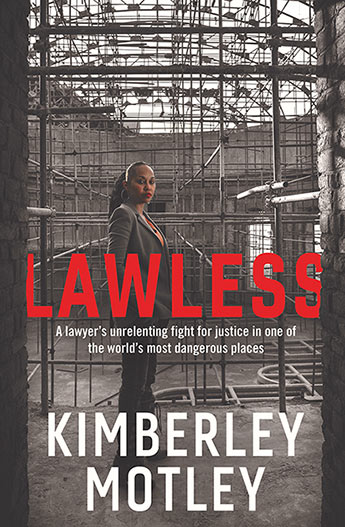
Lawless
Kimberley Motley
Allen & Unwin
Kimberley Motley’s book, Lawless, opened onto a tense courtroom scene, grabbing the reader’s attention from the first page to the last. Motley, as a criminal defence attorney, is trying to juggle many things. There is the drug charge of a young British man, who is accused of selling drugs in Ibiza and potentially facing nine years in jail, whom Motley is trying to exonerate, while simultaneously trying to reassure Laila, a victim of human trafficking in Afghanistan, to get in a car that will ultimately drive her to safety. It set the pace for the book, shifting from cities and continents with the thread of criminal justice allowing for Motley to showcase and build upon her legal skills in a way that has lasting impact.
Lawless is a unique book, offering insights into a world that is often hidden to those outside of the criminal justice system. Motley details her transition from being a working mother with three children in Milwaukee, USA, working within the public defender space (somehow juggling this as well as working as an academic at the local community college), to the Justice Sector Support Program (JSSP) in Afghanistan. JSSP was a program set up by the US government to support the government of Afghanistan in its development to managing its own criminal justice system – a task not without serious challenges. Motley is brought on board to assist in “capacity building” though quickly identifies that she’d like to be more actively involved in working with Afghans around their legal system rather than just ticking a box around training.
Having to learn to work within the Afghan legal system was a challenge, especially due to differences with the US legal system, such as different conceptions of the burden of proof and access to legal representation. Motley recalls an individual who was charged with terrorism offences in the National Security Court and had been beaten into confessing the crime, despite not having due process or understanding the charges put to them.
The ability of the local people to have legal representation was something Motley felt compelled to assist with, as she bluntly wrote:
“I’m not a traditional human rights lawyer, I’m a litigator.”
Stressing the fact that as a litigator in Afghanistan her primary audience is the Afghan court and judges, not human rights experts or speaking to a human rights panel or the international media.
In making this distinction Motley writes about taking on the case of a sixteen-year-old girl who had been raped and sentenced to twelve years imprisonment for “adultery by force.” Afghan law classed the case as a moral crime and Motley took it on as a defence attorney allowing her to argue before the Supreme Court to reduce her sentence then seek a presidential pardon.
The book is a fascinating read for a couple of standout reasons. Firstly, the way in which Motley writes is extremely personable, her empathy towards individuals caught up in the criminal justice system – wherever they may be – as well as her unrelenting fight for justice is admirable.
Motley speaks frankly and authentically about her life, including to struggle to pay the bills in her hometown of Milwaukee, and her transition from a public defender in the US to becoming the first foreign lawyer to practise in the Afghan court system.
Motley’s experience in both the US and Afghan system is peppered throughout the book and makes for an interesting comparison in understanding criminal justice responses to crime and concepts of criminality.
Secondly, in fighting to represent clients in places in which human rights are often not considered, Motley’s insights into Afghan society and the conception of justice can be challenging. She presided over a jirga (the village justice system) as a judge on a case about a six-year-old girl who was sold to clear a debt, while facing so many other challenges from a kidnapping case to literally trying to stay alive during an attack on her hotel. Motley through all this still had family issues to contend with, including the tragic shooting of her husband in Milwaukee.
The unflinching way in which Motley fights to ensure access to justice for her clients, wherever they might be is at the core of her story, one that in her words is all about “lifting and empowering people” and “fighting intelligently, strategically and, most importantly, effectively.”



